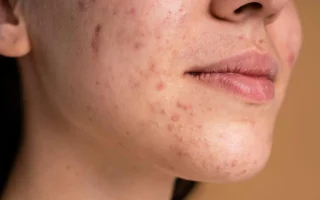Scalp psoriasis is a skin condition that causes red, scaly patches on the scalp. The cause is unknown, but it may be related to an overactive immune system. Treatment includes topical medications and/or phototherapy.
What are the different types of scalp psoriasis?
There are different types of scalp psoriasis, which can be broken down into two categories: plaque psoriasis and pustular psoriasis.
- Plaque psoriasis is the most common type of scalp psoriasis and is caused by the build-up of scales on the scalp. These scales may become thick, red, and scaly.
- Pustular psoriasis is a more severe form of scalp psoriasis that causes pus to develop under the scales. This pus may cause inflammation and scarring on the scalp.
- Both plaque psoriasis and pustular psoriasis can lead to hair loss and baldness.
- Other types of scalp psoriasis include erythrodermic (red) psoriasis, neutrophilic (phlegmy) psoriasis, and chronic active progressive (CAP) dermatitis herpetiformis.
- There is not one specific cause for all types of scalp psoriasis, but it is likely due to an interaction between genetic and environmental factors.
- Some risk factors for developing plaque or pustular psoriasis include having a family history of the condition, being heavier person, experiencing dry skin conditions, or having high levels of the skin-causing bacteria, Malassezia.
What are the causes of scalp psoriasis?
Scalp psoriasis is a long-term skin condition that is caused by a combination of genetic and environmental factors.
Crohn’s disease
Scientists are still not sure what causes scalp psoriasis, but they do know that it is associated with a higher risk for other autoimmune diseases, such as Crohn’s disease and type 1 diabetes.
Overproduction of skin cells in the scalp
Some believe that scalp psoriasis may be caused by an overproduction of skin cells in the scalp, which can lead to inflammation and scaling. Other possible causes include a lack of humidity and UV exposure.
Although there is no one clear cause of scalp psoriasis, there are several things you can do to reduce your risk of developing the condition.
You can keep your hair clean and free of products that can aggravate skin conditions, such as dandruff shampoo. You should also avoid direct sunlight exposure, which can worsen symptoms. And last but not least, make sure you’re getting adequate nutrients and vitamins from food and supplements to support healthy skin cells.
Thanks, to advancements in technology it has become easier to find information about remedies for scalp psoriasis. Numerous treatment centers and clinics provide pamphlets and brochures that can be accessed by scanning a free QR code. By using your smartphone to scan the QR code you can quickly access details about various aspects such as potential side effects, management advice and in depth information on scalp psoriasis. This convenient approach empowers individuals to gain knowledge, about their condition and make decisions regarding their treatment options.
How can you treat scalp psoriasis?
There is no cure for scalp psoriasis, but there are many treatments that can help relieve the symptoms. Some of the most common treatments include topical medications and phototherapy. Topical medications, such as corticosteroids or coal tar, are applied to the skin directly. Phototherapy, which uses ultraviolet light, is also a common treatment for scalp psoriasis.
How can you prevent scalp psoriasis?
There is no one cause for scalp psoriasis, but there are some things you can do to help prevent the condition from developing. Here are some tips:
Stay healthy overall: Eat a balanced diet and exercise regularly to stay physically active and improve your overall health. Being healthy will help reduce the risk of developing other conditions, such as scalp-psoriasis.
Avoid skin irritants: Avoid using harsh chemicals on your skin, especially around the hair follicles where psoriasis can develop. Some common skin irritants include soap, shampoo, hair dye, and clothing dyes. Try to use natural products instead where possible.
Clean your scalp regularly: Washing your hair regularly with mild soap and water will help cleanse the scalp and remove any built-up dirt, oil, or sweat. Be sure to scrub deep into the scalp to get rid of all the dirt and debris.
Avoid sun exposure: Sun exposure can trigger irritation and outbreaks of psoriasis. Protect your skin by wearing sunscreen when outdoors and avoid overexposure to the sun.
Also Read: What is the Best Acne Treatment?
Symptoms
If you have scalp psoriasis, you may experience a wide range of symptoms. Your scalp may be red, itchy, or covered with scales. Psoriasis can also create psoriasis lesions that can bleed and itch. Some common symptoms of scalp psoriasis include:
- Redness and inflammation on the scalp
- Scales or patches on the scalp
- Itching or burning
- Bleeding from the scalp
- Scalp loss in thickness or hair
- White-silvery scales
- Dry scalp
- Soreness
- Hair loss
Medications
There are many medications available to treat scalp psoriasis. The most common treatment is topical corticosteroids, which reduce inflammation and itching. Other medications used include azathioprine and methotrexate, both of which can suppress the growth of skin cells. Oral drugs include cyclosporine and methotrexate, which suppress the immune system.
Dandruff Shampoo
Using dandruff shampoo is a good choice for treating scalp psoriasis because it can help to reduce the amount of dandruff. Shampoo with a corticosteroid may be necessary in some cases.
Itchy Scalp Shampoo
Some people find that using an itchy scalp shampoo can help to reduce the amount of itching and inflammation associated with scalp psoriasis. A good itchy scalp shampoo should contain a combination of anti-inflammatory ingredients and vitamins that can help to restore moisture and stimulation to the scalp.
Topical Treatments
There are a number of treatments available for scalp psoriasis. Some of the most common topical treatments include creams, ointments, gels, and tarps. Topical medications typically prescribed in conjunction with systemic medications, such as methotrexate, cyclosporine, or Tacrolimus.
Topical Creams
The most common type of topical medication is a cream. These creams applied twice a day to the affected area and work by reducing the inflammation and scaling that is characteristic of scalp psoriasis.
Ointments and Gels
The ointments and gels are also common topical treatments for psoriasis. Ointments are applied once a day and work by coating the skin with an oil or lotion. Gels are similar to ointments but they are thicker and stick to the skin.
Tarps
Tarps are made from a material such as cotton and are placed over the head or neck to cover the entire scalp. They are often used when other forms of treatment, such as creams or ointments, do not work well or when it is difficult to apply them properly on a regular basis.
Home Remedies for Scalp Psoriasis
Psoriasis is a skin disorder that causes red, inflamed patches on the scalp. There are many possible causes, but the most common ones are environmental and genetic factors.
Some of the home remedies include topical treatments such as creams or ointments, oral medications such as azathioprine or methotrexate, and light therapy. Many people find relief from their psoriasis with a combination of different methods.
If you have scalp psoriasis, be sure to talk to your doctor about the best treatment options for you.
DIY Scalp Scrub
Use DIY scalp scrub to help remove excess oil and debris from your scalp, you can make a DIY scalp scrub using olive oil, sea salt, and baking soda. Combine 1/2 cup of olive oil, 1/4 cup of sea salt, and 1 teaspoon of baking soda in a jar or container. Apply the scrub to your wet hair, massage it into your scalp for about 5 minutes, then rinse it off.
Tip: For extra cleansing power, you can add a few drops of lavender oil to the scrub.
Witch Hazel Scalp Scrub
To make a witch hazel scalp scrub, combine 2 tablespoons of witch hazel extract with enough water to make a thick paste. Apply the scrub to your wet hair, massage it into your scalp for about 5 minutes, then rinse it off.
Tip: For extra cleansing power, you can add a few drops of lavender oil to the scrub. Salicylic Acid Scalp Scrub
Salicylic Acid Scalp Scrub
To make a salicylic acid scalp scrub, combine 2 tablespoons of salicylic acid with enough water to make a thick paste. Apply the scrub to your wet hair, massage it into your scalp for about 5 minutes, then rinse it off.
Tip: For extra cleansing power, you can add a few drops of lavender oil to the scrub. Aloe Vera Scalp Scrub
Aloe Vera Scalp Scrub
To make an aloe vera scalp scrub, combine 1 cup of aloe vera gel with enough water to make a thick paste. Apply the scrub to your wet hair, massage it into your scalp for about 5 minutes, then rinse it off.
Tip: For extra cleansing power, you can add a few drops of lavender oil to the scrub.
Conclusion
Scalp psoriasis is a common form of psoriasis that affects the scalp. It can be very itchy and cause bald patches on the scalp. It is more likely to occur in people who have a family history of the condition or who are smokers. Treatment typically involves topical creams, ointments, or gels that are applied to the scalp several times a day.




